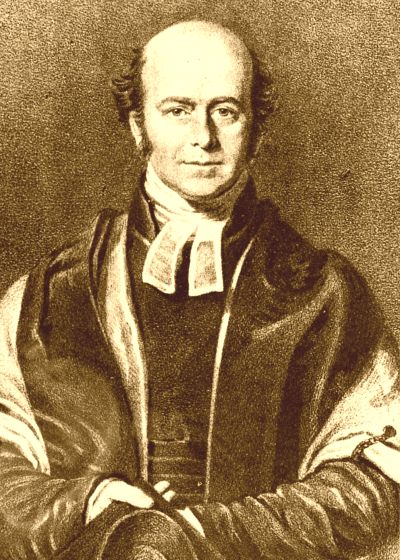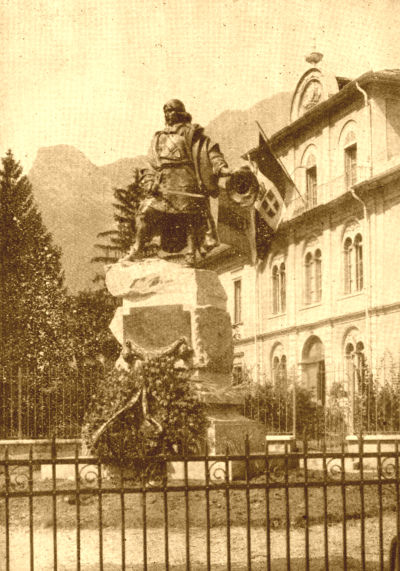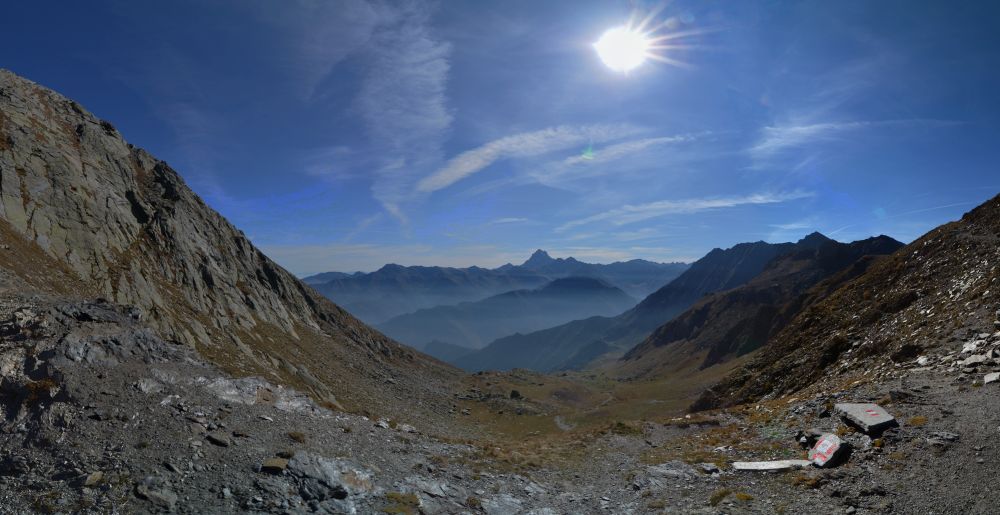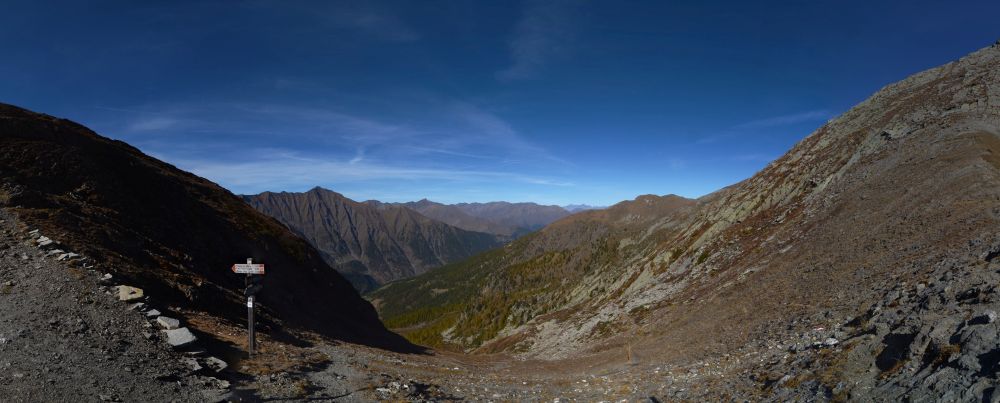Vista dal Colle verso il Monviso “sorvolando” la Val Pellice.
Vista dal Colle verso la Val Germanasca.
Il 13 luglio 1829 da questo Colle transitava
William Stephen Gilly, pastore Anglicano venuto in Piemonte a portare
il supporto britannico alla popolazione valdese.
Per lui si trattava della strada che conduce da Bobbio a Prali; non di
una gita amena. È curioso notare come le descrizioni del paesaggio che
fa sono, tutto sommato, ancora attuali.

William Stephen Gilly.
Tratto da: Viaggaitori britannici alle valli valdesi; Claudiana; 1994.
This last ascent was not performed till past eleven o'clock: it was
consequently under a flamming sun that we scrambled up the Col Julien,
and more than once did we stop to rest our weary limbs. One of our
party was so overcome by heat and fatigue, that whenever we stopped for
a minute or two, he lay down and instantly fell asleep. Before we
gained the summit we were joined by-four robust peasants, whose bare
heads, and arms, and legs, and rapid advance upon us, made us wonder
what brought them there. They were crossing the mountain to cut grass
on the other side.
Sultry as the weather was, yet the snow was still lying in place.
Screened from the sun's rays. When we reached the spine of the
mountain, the aspect of the country was totally different on the other
side. The steep by which we had ascended was without a tree; the one
which we had to descend was at first bare of all vegetation for some
hundred yards, but beyond this there were forests extending along the
sides of the declivities, and plots of rich herbage enamelled with
flowers. On one bank I counted seven different orts, The rapidity of
the descent towards Prali was such, that we found it necessary to
proceed with caution; but, in the meantime, the four peasants set off
at quick pace, and were far away and busily employed cutting the grass
for which they came, long before we had reached the bottom of the first
steep. This region is very productive of that which serves as winter
fodder for the cattle, for we fell in with several groups of
mountaineers, who had collected some large bundles of long grass mixed
with moss, with which they were plodding their way home; and to judge
from the distance we walked before we came to any habitations, they
must have had much ground to traverse ere they arrived at the place
where they began to cut it.
Having traced our way to the summit of the Col Julien by the course of
a torrent, we descended towards the habitable part of the commune of
Prali, […]
Tratto da: Waldesian researches during a second visit to the Vaudois of
Piemont; William Stephen Gilly; London 1831.
Ma nel 1689 lo stesso valico è stato teatro di guerra durante il
Glorioso Rimpatrio del Valdesi. Ecco il racconto tratto da Histoire del
la Glorieuse Rentrée des Vaudois dans leurs vallées par Henry Arnaud
pasteur et colonel des vaudois. Pignerol, Imprimerie Chiantore et
Mascarelli, 1880.

Monumento ad Henry Arnaud. Torre Pellice - Casa Valdese.
Tratto da: Stria dei Valdesi; E. Comba; Claudiana 1935.
Le 29 Août, Monsieur Arnaud aïant fait publiquement la prière, on
partit dans le dessein de passer le Col Julien, pour descendre dan la
vallée de Luzerne. Près de la Ferrouillarie ils rencontrèrent un cheval
qui, marchant tout seul, leur fit bien juger que les ennemi n'étoient
pas fort éloignés, peu après on trouva un païsan , qui fut tüé parce
qu'il se sauvoit, et après avoir encore un peu marché, on vit un
sergent des Gardes de S. A. R., aïant pour guide un païsan: ce sergent
étant étant à la portée de voix d'un officier qui étoìt accompagné, lui
cria: N'étesvous pas le Marquis de Parelle ? L'officier aïant repondu
en piémontois que oüi, il s'avança et fut ainsi pris; on tüa son guide,
et lui dans l'appréhension d'un tel sort, promit de découvrir tout ce
qu'il savoit: en effet, il avoüa qu'il avoit été envoïé dans la vallée
de S. Martin pour savoir l'état des Vaudois, qu'il étoit de
l'avant-garde des ennemis, qu'il y avoit 200 des Gardes de S. A. R. qui
les attendoient au Cou Julien' bien retranchés, et qu'il y avoit déia
17 jours que Ie régiment des Gardes étoit parti de Nice, pour venir
dans les vallées, c'est-a-dire 3 yours avant le départ des Vaudois.
Sur ce rapport on se sépara à l'ordinaire en trois troupes, l'une
prenant la droite, l'autre la gauche et la troisième, qui faisoit le
gros, tenant la pointe. Celle de la droite aïant atteìnt la hauteur du
bois, y voulut faire halte pour s'y reposer, mais aïant été découverte
par une sentinelle ennemie, elle fit diligence pour occuper Ie poste
avant que les ennemis le lui vinssent disputer: eIIe n'eut aussi que le
tems de le faire, car les ennemis étant accouru dans le même dessein,
peu s’en fallut qu'ils ne le gagnassent: aïant vû que les Vaudois les
avoient prévenu, ils se retirèrent bien vite et à la faveur de quelques
nüages fort épais, en criant de toute leurs forces et fort sottement:
Venez, venez , Barbets du Dible, nous avons saisi tous les postes et
nous sommes plus de 3000, ajoutant par rodomontade: Qu'on dise à
Monsieur le Chevalier qu'il prenne bien garde à son poste, et à mesure
que les Vaudois approchoient d'eux, la sentinelle se tüoit de crier:
Qui vive? qui vive? si vous ne parlez, je tire! je tire! Cependant
personne d'entre eux ne le faisoit, tant ils étoient saisis de peur.
Enfin les Vaudois, transportés d'envie d'en venir aux mains, prirent la
généreuse résolution d'aller attaquer ces fanfarons jusques dans les
retranchemens où ils se croioient bien en sûreté: mais quand ils virent
que c'étoit tout de bon, et qu'ils alloient être pris de tous côtés,
après quelques décharges assez rudes pendant une demi heure, ils
abandonnèrent honteusement tous leur postes, y laissant leurs vivres ,
les munitions et bagage, jusqu'aux riches habits du Commandant. Cela se
passa ainsi avec perte, du côté des Vaudois, d'un seul Luzernois nommé
Josüé Mandan', mais vaillant homme, qui mourut de ses blessures le
lendemain matin aux Pausettes, où il fut enterré sous un rocher.
Les fuïrds firent leur retraite avec une si grande précipitation et
dans une si grande épouvante jusqu'au couvent du Villar, qu'ils
n'eurent seulement point la précaution de donner aucun avis ni à ceux
de Serre le cruel, ni à l'Aiguille, ni à Bobi.
Le Cou Julien ainsi gagné, on poussa jusques au lieu nommé les
Passarelles de Julien, où on attrapa et tüa encore 31 desdits fuïards ,
et trois chevaux parmi lesquels étoit celui du Commandant, avec les
pistolets encore à l'arçon de la selle. On alla passer la nuit près de
l'Aiguille, où on fut fort incommodé de la pluie; l'incommodité qu'on
souffrit cette nuit, favorisa l'évasion du sergent dent il a été
ci-dessus parlé, lequel aïant trouvé moïen de se délier, trouva celui
de se sauver en se glissant et se roulant de la montagne en bas.






